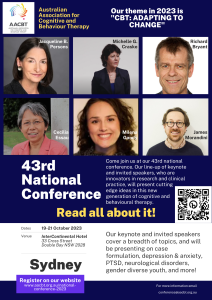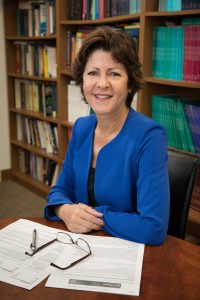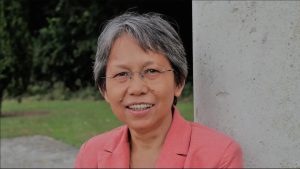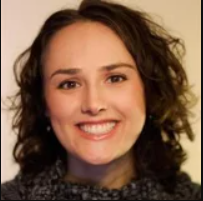AACBT 43rd National Conference
Keynote and Invited speakers
|
Keynote speakers:
Invited speakers: |
 |
Professor Jacqueline B. Persons
Director, Oakland CBT Center, Oakland, CA and Clinical Professor, Dept of Psychology, University of California at Berkeley
Keynote speaker – plenary address: The case formulation approach to cognitive behaviour therapy: Why use it?
Dr Persons will provide an overview of the elements of the case formulation to cognitive behaviour therapy, and a rationale for using the method, relying on many clinical examples as she does so.
The case formulation approach to cognitive behaviour therapy (CBT) calls for clinicians to develop a cognitive-behavioural formulation of each case they are treating, use the formulation to guide the process of setting treatment goals and intervening to help the client accomplish their goals, and monitor the client’s progress in every session. Dr Persons will briefly describe the key elements of case formulation-driven CBT and will describe a wide range of ways the case formulation approach is helpful to the clinician, including by aiding in the process of personalizing therapy, and helping the therapist overcome treatment failure, build a strong therapeutic relationship, handle comorbidities, select treatment approaches, and coordinate treatment plans that have multiple elements.
Click on this link for a preview of Dr Persons speaking.
University of California, Los Angeles

Keynote speaker – plenary address: Reward sensitivity as a risk factor and treatment target for depression and anxiety
This keynote will present the evidence for hyposensitivity to reward as a risk factor and as a treatment target for depression and anxiety.
Threat and reward sensitivity are fundamental processes that become dysregulated in the context of vulnerability to, or expression of, anxiety and depression. Treatments have traditionally targeted reductions in threat sensitivity with limited effects upon reward mechanisms. Investigation of reward sensitivity is essential for our understanding of psychopathology and for targeted treatment approaches. I will present our latest findings regarding neural, behavioral and subjective features of reward hyposensitivity (specifically in domains of reward anticipation-motivation, response to reward attainment, and reward learning) that correlate with and predict anxiety, depression and anhedonia. These findings led us to develop a treatment that specifically targets reward hyposensitivity, termed Positive Affect Treatment, which we have shown to be more effective than cognitive behavioral therapy that specifically targets negative affect and threat sensitivity. I will present our replication study in anxious, depressed and extremely low positive affect individuals, where the symptomatic outcomes occur in parallel with changes in target measures of reward anticipation-motivation and attainment. I will also present findings from virtual reality technologies for delivering aspects of Positive Affect Treatment. I will conclude with evidence for reward-related mechanisms within the context of exposure therapy for fears and anxiety, and potential methods for targeting such mechanisms.
Click on this link for a preview of Dr Craske speaking.
University of New South Wales
Invited speaker – plenary session: Can we treat PTSD better than we currently do?
Scientia Professor Richard Bryant is a world expert in assessing and treating trauma-related disorders (PTSD). His talk will showcase the latest scientific research into trauma-focused therapy for PTSD; how well it works, who it works best for, and what factors influence treatment outcome. You’ll hear an interesting analysis of why recent attempts to improve outcomes using pharmacological therapy ‘enhancers’ have failed to improve PTSD treatment, and learn about promising alternative treatment strategies to improve treatment outcomes for PTSD.
University of Roehampton, London

Invited speaker – plenary session: Cultural adaptation and implementation of CBT for anxiety and depression in young people
Professor Cecilia Essau is a world expert in the understanding and treatment of mental disorders in youth across cultures. Learn about how culture shapes the way mental illness is understood, how it presents, and influences how, where, and why people seek help. Hear about her latest work on adapting CBT ‘Skills for Life’ youth program across various cultural backgrounds, and the challenges and opportunities of delivering evidence-based culturally-adapted CBT programs in school settings.
Macquarie University

Invited speaker – plenary session: Enhancing the psychological care of people with neurological disorders
Dr Milena Gandy is an expert in the assessment and treatment of mental health in people with neurological disorders. Hear about how to support the mental health of people with neurological disorders, practical tips about how to modify assessment and treatment skills, the latest research into digital CBT and cognitive rehabilitation for people with these disorders.
King Street Psychology Clinic
Invited speaker – plenary session: Exploring the diversity of gender diverse youth: implications for research and clinical practice
Dr James Morandini is an expert in research related to gender identity and sexuality. His talk will cover the latest knowledge about gender diversity in youth, and what the evidence says about the impact of gender-affirming social and medical interventions on mental health and psychosocial functioning in gender diverse young people.
Book your tickets here!

